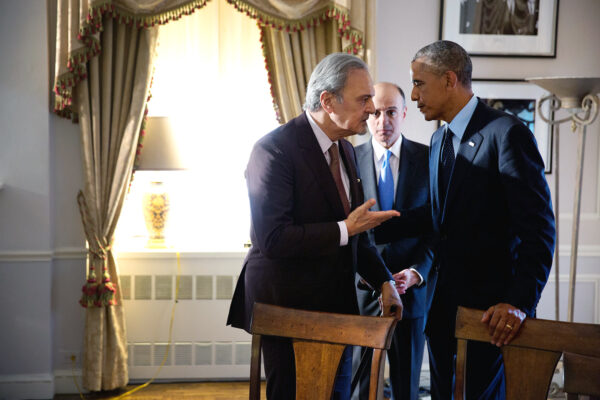
After signing a landmark agreement with Iran in July that should prevent the country from developing nuclear weapons, the United States have little choice but to reassure their Arab allies that the deal will not leave them in the cold.
The Financial Times‘ Roula Khalaf laments that America has “fallen into the trap” of appeasing Iran’s rivals in the Middle East. It has resumed military aid to Egypt, despite the army’s coup against a democratically-elected if Islamist government there. It has lifted restrictions on arms sales to Bahrain, despite the Sunni regime’s crackdown on a Shia-led uprising in the small Persian Gulf state. And it has largely remained silent about Saudi Arabia’s military campaign in Yemen where the kingdom says it is battling Iranian proxies.
The United States have misgivings about the war, Khalaf reports. It is far from clear if Iran is indeed behind the northern Houthi rebellion that dislodged the friendly government of President Abd Rabbuh Mansur al-Hadi earlier this year. And Saudi Arabia’s airstrikes are far from discriminate. Hundreds of civilians have perished in bombardments so far.
But appearing to oppose the Gulf campaign while trying to sell the Iran deal in Washington and in the Middle East would have left the Obama Administration open to charges that it was going soft on Iran and letting down its Arab allies.
Despite all these gestures, Khalaf argues that America’s Sunni allies remain critical.
But the point is not to muzzle them. The point is to reassure them that, as administration officials like Secretary of State John Kerry have publicly said, the nuclear agreement will not involve a “grand bargain” with Iran that sees the United States acquiescence in its hegemonic exertions.
The Sunni monarchs have reason to be nervous. Any form of rapprochement between Iran and the United States comes at the expense of their perceived role as Iran’s balancers. If the Americans see Iran as less of a threat to stability in the Middle East, there is less of a need to maintain awkward alliances with unsavory regimes on the other side of the Persian Gulf.
At the same time, the United States cannot simply end decades-old partnerships in favor of a pact with an Iran that still sponsors terrorist organizations and talks openly of destroying Israel.
The trouble in America’s Middle East policy has been that it seemed exclusively on the side of one sect, the Sunnis. The Iran nuclear deal is not meant to switch that allegiance the other way. But it can be a first step toward what Greg R. Lawson has recommended at the Atlantic Sentinel for years; for the United States to “pivot” on the Shia-Sunni divide.
“If Iran and the United States can come to some terms, the ability to tilt between the Sunni Saudi and Turkish regimes and the Shia ascendancy in Iran and Iraq will be possible,” Lawson has argued.
America’s interests aren’t served by a Sunni-centric strategy. It would only stand to lose from a conflict across the Persian Gulf through which more than a third of all the oil shipped worldwide transits. It could use Iran’s help against fanatical Sunni groups like the Taliban in Afghanistan and the self-declared Islamic State in Iraq and Syria. Gulf allies, including Qatar and Saudi Arabia, haven’t always been helpful in containing political Islam and jihadism. And should America be seen as a Shia ally, it would have even more difficulty affecting the civil war in Syria where a Sunni majority is in revolt against an Iranian-backed minority regime.
America must not pick Iran’s side, as some of its Arab allies fear it might. Nor can it shun Iran indefinitely, as hawks both in the region and at home would like. It must try a middle way. Not in order to satisfy everybody but so that it can safeguards its interests in the Middle East at minimal cost.
